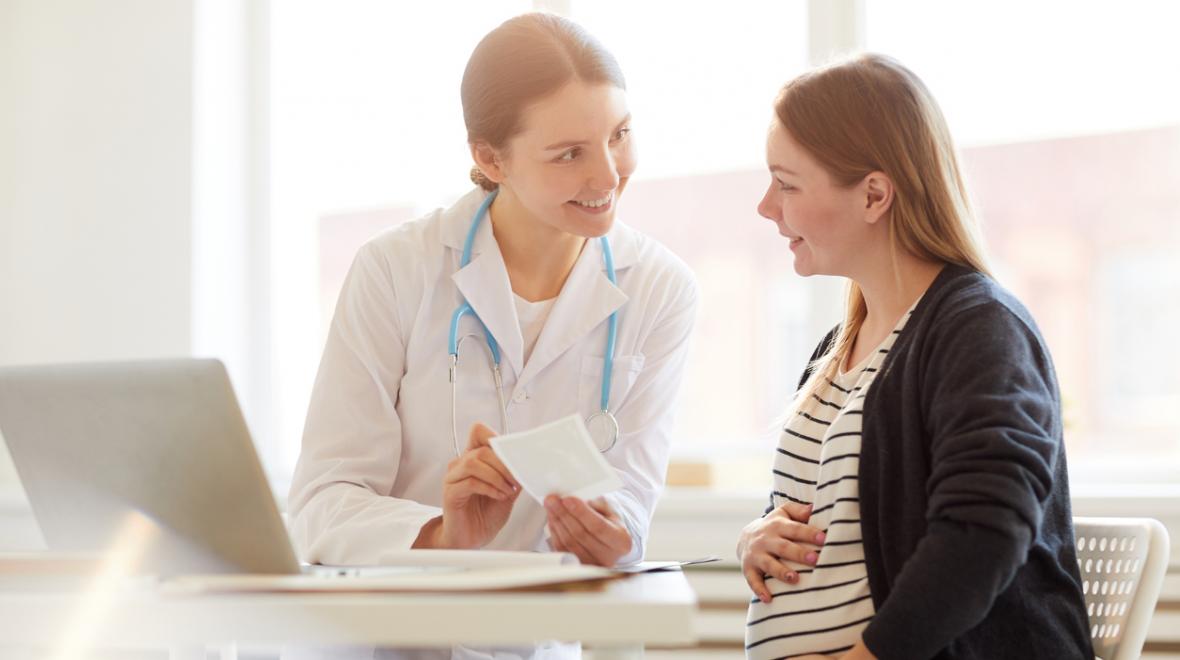
Editor's note: This article was sponsored by Overlake Medical Center and Clinics.
Cradling her 2-week-old son in an infant carrier, Kadee Tuttle was starting what she thought was a typical Wednesday. Suddenly, her chest was gripped by pressure so intense that she thought she might be in cardiac arrest. She quickly called her doctor, who told her to go to the nearest emergency room.
At the hospital, Tuttle was relieved to learn that her heart was fine. But the news wasn’t all good: The source of the pain and pressure, and the likely cause of the heartburn she’d experienced during her pregnancy, was her gallbladder.
“I remember the pain when the doctor touched the area below my right breast,” she says. “That confirmed what he suspected — gallstones — which I then learned are more common during pregnancy than at any other time in a woman’s life.”
Tuttle’s gallstones and GI symptoms meant she was a candidate for cholecystectomy, i.e., gallbladder removal surgery. The next day, she followed up with her primary care provider and researched natural remedies online, thinking she had more time to decide. But just two days after her emergency room visit, her pain level intensified and she began vomiting bile, the neon-green digestive liquid produced in the liver.
“I woke very early Friday morning in excruciating pain,” she recalls. “My husband rushed around the house to pack up our 2-week-old and 3-and-a-half-year-old, but I couldn’t wait any longer. Hopped up on pain meds with breast pump in hand, I drove myself to the hospital.” A few days later, her troublesome gallbladder was surgically removed.
Gallbladder 101
Most people don’t give their gallbladder a second thought, and with good reason. Considered an “accessory” organ, the gallbladder helps with digestion but isn’t part of the digestive tract. Instead, it’s a storage vessel of sorts. About the size and shape of a small pear, the gallbladder sits under the liver, where it stores and concentrates the bile that helps digest fatty foods.
Hormone fluctuations during pregnancy can predispose women to gallstones.
After a fatty or high-protein meal, the gallbladder is stimulated to release bile into the small intestine, explains Adel El-Ghazzawy, M.D., a board-certified general surgeon who practices at Overlake Medical Center. “Normally, the entire process is pretty seamless,” he says. But inflammation or gallstones — small, hard masses that can form in the gallbladder or bile ducts — can interrupt this process, resulting in pain, gas, nausea, cramping and diarrhea.
How pregnancy affects the gallbladder
Women are at a higher risk for gallbladder problems overall, and pregnancy increases the rate of complications. Twelve percent of pregnant women have gallstones, and gallbladder removal surgery is the second-most-common non-obstetric procedure performed during pregnancy.
There are a lot of theories regarding why gallbladder problems are more prevalent during pregnancy, says El-Ghazzawy. “Hormone fluctuations during pregnancy can predispose women to gallstones. During pregnancy, there are also changes to the abdominal cavity that lead to stresses on the digestive system,” he says.
When the gallbladder can’t function normally, stored bile builds up and digestion is affected, particularly after eating fatty or protein-rich foods. A gallbladder attack is a sudden bout of pain, often radiating from the sternum or right side of the abdomen through the back. “Gallbladder attack or pain is often in the right upper quadrant of the abdomen, and can be 7 to 10 on the pain scale,” says Jovanni Neblett-Blackmon, M.D., a board-certified obstetrician/gynecologist with eMediHealth. “The pain can often gradually get worse, but it comes and goes intermittently.”
Gallbladder surgery during or after pregnancy
Some women experience pain so intense that their gallbladder needs to come out during pregnancy, usually during the second trimester. Some, like Tuttle, don’t experience a gallbladder attack until after pregnancy. “We try to postpone the surgery until after six weeks postpartum if possible,” says El-Ghazzawy.
Pregnant women with gallstones or inflamed gallbladders can manage their symptoms by eating smaller, more frequent meals and avoiding foods high in fat, says Neblett-Blackmon. Acetaminophen is safe to take during pregnancy and can help ease mild gallbladder-related pain.
Gallbladder removal surgery is typically a same-day procedure; new mothers can expect to be home the same night. After a week or so of rest, most can resume their regular routine — within reason. Lifting and carrying a small newborn is safe, but lifting a boisterous 30-pound toddler may have to wait. Allow a bit longer for the digestive tract to adjust. Within two to six weeks, most women can go back to their regular diets.
Most people adjust to life sans gallbladder without a problem, says El-Ghazzawy. “The body adjusts quite well. The gallbladder doesn’t produce bile; it stores the bile that’s produced in the liver. Because our ancestors probably ate much less frequently, this type of bile storage was important. Today, we eat more often, so it’s less vital to have bile stored up.”
Following a few days of lab work and hospital tests, Kadee Tuttle’s gallbladder removal surgery went off without a hitch, she says. The intense, radiating pain is gone, and she’s able to eat normally. Despite the stress, she wouldn’t do anything differently. “It’s nothing you can plan for,” she says. “If you ever find yourself in this situation, I would just say to accept all the help that comes your way.”
|
Sponsored by: |
 |











